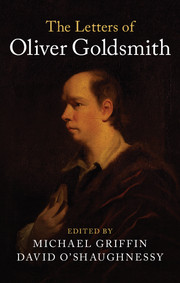25 - To the St. James's Chronicle, London, 25 July 1767
Summary
Goldsmith's letter to the St. James's Chronicle; Or, the British Evening-Post was prompted by two separate letters the newspaper had recently printed. The first was an almost apologetic correction from ‘D. H.’ in a letter printed in the issue for 12–14 May. Goldsmith had endorsed the recent publication of Blainville's Travels through Holland, Germany, Switzerland and Italy, 3 vols. (London: J. Johnson, B. Davenport and T. Cadell, 1767). The various advertisements for this work claimed that it had never been published, a claim that was exposed as spurious by the letter-writer. ‘D. H.’ had ‘too much Respect for Dr. Goldsmith to suffer him to authorise so pitiful an Artifice’. The various advertisements for Blainville's Travels in the St. James's Chronicle and other newspapers do not, however, contain any reference to Goldsmith so it is not clear how his endorsement was publicized. In any event, Goldsmith owns up to his error in his letter and is happy to concede his mistake.
The second, more serious accusation, was an anonymous letter, often attributed to William Kenrick, in its issue for 18–21 July 1767. Kenrick had replaced Goldsmith as chief reviewer for the Monthly Review and had written a caustic review of Goldsmith's An Enquiry into the Present State of Polite Learning (1759), probably at the instigation of Ralph Griffiths, the proprietor. ‘DETECTOR’ accuses Goldsmith of plagiarism: the substance of his claim is that Goldsmith’s poem ‘Edwin and Angelina’ was inappropriately derived from a ballad in Percy’s Reliques of Ancient English Poetry (1765). The letter is reproduced here:
To the Printer of the ST. J. CHRONICLE.
SIR,
IN the Reliques of antient Poetry published about two Years ago, is a very beautiful little Ballad called “A Frier of Orders Grey.” The ingenious Editor Mr. Piercy supposes that the Stanzas sung by Ophelia in the Play of Hamlet, were Parts of some Ballad well known in Shakespeare's Time, and from these Stanzas, with the Addition of one or two of his own to connect them, he has formed the above-mentioned Ballad; the Subject of which is, a Lady comes to a Convent to enquire for her Love–, who had been driven there by her Disdain. She is answered by a Frier that he is dead.
- Type
- Chapter
- Information
- The Letters of Oliver Goldsmith , pp. 73 - 76Publisher: Cambridge University PressPrint publication year: 2018



